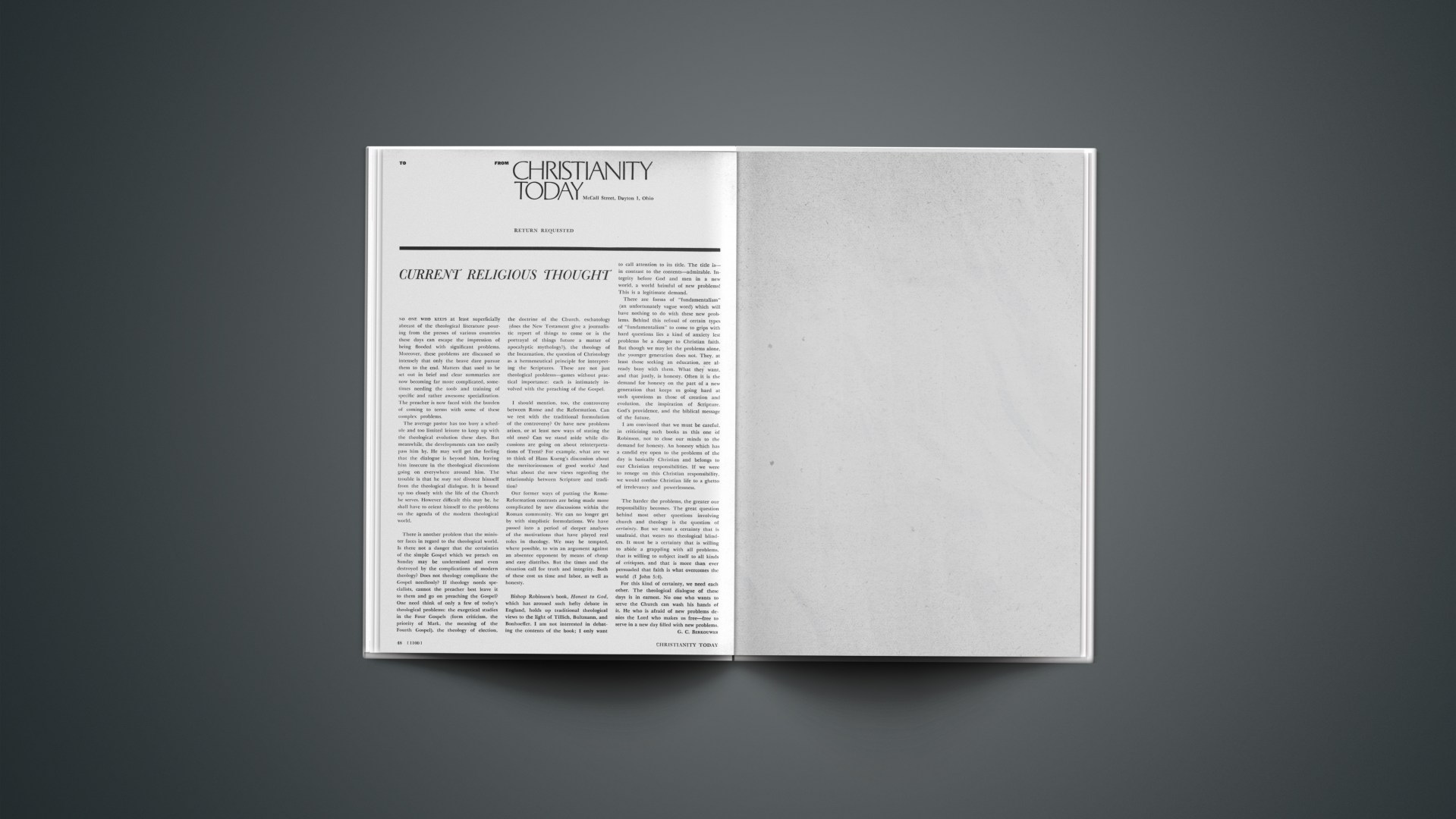No one who keeps at least superficially abreast of the theological literature pouring from the presses of various countries these days can escape the impression of being flooded with significant problems. Moreover, these problems are discussed so intensely that only the brave dare pursue them to the end. Matters that used to be set out in brief and clear summaries are now becoming far more complicated, sometimes needing the tools and training of specific and rather awesome specialization. The preacher is now faced with the burden of coming to terms with some of these complex problems.
The average pastor has too busy a schedule and too limited leisure to keep up with the theological evolution these days. But meanwhile, the developments can too easily pass him by. He may well get the feeling that the dialogue is beyond him, leaving him insecure in the theological discussions going on everywhere around him. The trouble is that he may not divorce himself from the theological dialogue. It is bound up too closely with the life of the Church he serves. However difficult this may be, he shall have to orient himself to the problems on the agenda of the modern theological world.
There is another problem that the minister faces in regard to the theological world. Is there not a danger that the certainties of the simple Gospel which we preach on Sunday may be undermined and even destroyed by the complications of modern theology? Does not theology complicate the Gospel needlessly? If theology needs specialists, cannot the preacher best leave it to them and go on preaching the Gospel? One need think of only a few of today’s theological problems: the exegetical studies in the Four Gospels (form criticism, the priority of Mark, the meaning of the Fourth Gospel), the theology of election, the doctrine of the Church, eschatology (does the New Testament give a journalistic report of things to come or is the portrayal of things future a matter of apocalyptic mythology?), the theology of the Incarnation, the question of Christology as a hermeneutical principle for interpreting the Scriptures. These are not just theological problems—games without practical importance: each is intimately involved with the preaching of the Gospel.
I should mention, too, the controversy between Rome and the Reformation. Can we rest with the traditional formulation of the controversy? Or have new problems arisen, or at least new ways of stating the old ones? Can we stand aside while discussions are going on about reinterpretations of Trent? For example, what are we to think of Hans Kueng’s discussion about the meritoriousness of good works? And what about the new views regarding the relationship between Scripture and tradition?
Our former ways of putting the Rome-Reformation contrasts are being made more complicated by new discussions within the Roman community. We can no longer get by with simplistic formulations. We have passed into a period of deeper analyses of the motivations that have played real roles in theology. We may be tempted, where possible, to win an argument against an absentee opponent by means of cheap and easy diatribes. But the times and the situation call for truth and integrity. Both of these cost us time and labor, as well as honesty.
Bishop Robinson’s book, Honest to God, which has aroused such hefty debate in England, holds up traditional theological views to the light of Tillich, Bultmann, and Bonhoeffer. I am not interested in debating the contents of the book; I only want to call attention to its title. The title is—in contrast to the contents—admirable. Integrity before God and men in a new world, a world brimful of new problems! This is a legitimate demand.
There are forms of “fundamentalism” (an unfortunately vague word) which will have nothing to do with these new problems. Behind this refusal of certain types of “fundamentalism” to come to grips with hard questions lies a kind of anxiety lest problems be a danger to Christian faith. But though we may let the problems alone, the younger generation does not. They, at least those seeking an education, are already busy with them. What they want, and that justly, is honesty. Often it is the demand for honesty on the part of a new generation that keeps us going hard at such questions as those of creation and evolution, the inspiration of Scripture, God’s providence, and the biblical message of the future.
I am convinced that we must be careful, in criticizing such books as this one of Robinson, not to close our minds to the demand for honesty. An honesty which has a candid eye open to the problems of the day is basically Christian and belongs to our Christian responsibilities. If we were to renege on this Christian responsibility, we would confine Christian life to a ghetto of irrelevancy and powerlessness.
The harder the problems, the greater our responsibility becomes. The great question behind most other questions involving church and theology is the question of certainty. But we want a certainty that is unafraid, that wears no theological blinders. It must be a certainty that is willing to abide a grappling with all problems, that is willing to subject itself to all kinds of critiques, and that is more than ever persuaded that faith is what overcomes the world (1 John 5:4).
For this kind of certainty, we need each other. The theological dialogue of these days is in earnest. No one who wants to serve the Church can wash his hands of it. He who is afraid of new problems denies the Lord who makes us free—free to serve in a new day filled with new problems.









